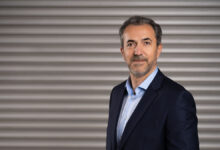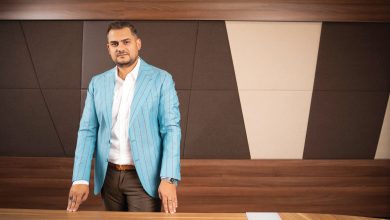Roxana Gureanu, Managing Director at Habau in Romania: Stronger Together for the Challenges of the Future

Roxana Gureanu has over 20 years of progressive finance and operational leadership experience, deep business knowledge, and proven success with global and emerging organizations. She worked for global companies like Reuters and Coca-Cola HBC. She also served nearly 15 years with Austrian companies such as S+B Gruppe, amb Holding, and PORR Construct, where she enabled companies’ growth strategies while holding increasingly senior finance and project management roles.
Besides her passion for strategic finance, Roxana shows a very good understanding of the IT&C industry and a strong entrepreneurial mindset. She co-founded Class IT Outsourcing, the first IT outsourcing company in Romania at the time. She is also an active presence in the business community being a member of the CEO Clubs, Envisia-Board of Directors, Petroleum Club of Romania, Romanian Business Leaders – Repatriot, and PWN Romania.
Roxana has a Banks & Stock Exchange and environmental protection dual degree from ASE Bucharest and a master’s degree from the same school, an EMBA with the WU Executive Academy, and she is certified as a board member by the Henley Business School/University of Reading as well as by Envisia in partnership with BVB.
Habau Romania, part of Habau Group, is a key player in the strategic energy infrastructure industry at a local and European level. The company is actively contributing to increasing energy security in the region by ensuring access to alternative sources of gas.
With a history of over 100 years, operations in 13 countries, a turnover exceeding 1.92 billion euros, and 6,500 employees, the international full-service provider Habau Group is well known for consistently delivering their projects and partnerships amongst equals. Habau Romania’s business success is built on Habau Group’s foundation of good governance, innovation, quality, and a commitment to excellence. Habau Romania has active branches in Serbia, Bulgaria, and the Republic of Moldova.
Among the significant projects of Habau Romania, is the Romanian section of the strategic pipeline BRUA (Lot 2 and Lot 3), the compressor stations Jupa and Gheraesti, and the gas interconnector between Serbia and Bulgaria on the Serbian territory.
Roxana Gureanu, the Managing Director-Commercial of Habau Romania and its active European regional branches, shares insights on the challenges and opportunities in the energy sector, and her strategic approach to leadership.
Dear Roxana Gureanu, you’ve been with Habau Romania for five years now. How has your role as Managing Director evolved during this time, and what key initiatives have you undertaken to position the company as a leader in the energy infrastructure sector?
Roxana Gureanu: Over the past five years, my role as Managing Director-Commercial at Habau Romania has been focused on driving strategic initiatives and building strong partnerships to create a system to ensure consistent growth, as excellence is a matter of habit.
I am responsible for keeping a commercial and financial eye on the successful progress of our projects, keeping the overall finances, cash flow, and cash pooling in balance, while ensuring, that we can operate smoothly from a financial perspective, so our appreciated employees can do their job in a safe, secure, and stable work environment.
During this time, I have concentrated on assembling a talented team and attracting top-tier professionals to support the company’s growth and success.
I am happy to have a great and experienced management colleague on my side at HABAU in Romania, next to whom I learned a lot and impactfully contributed to our overall business success. I’m also fortunate to have a visionary board that trusts HABAU Romania’s executive team to further grow the company’s business, to develop the organization and colleagues’ skills.
One of my key responsibilities has been to provide strategic financial guidance including accurate forecasting, efficient capital allocation, risk mitigation, and identifying growth opportunities. By closely collaborating with the technical team, we have helped ensure that our financial strategies are aligned with our operational goals, enabling us to make informed decisions and drive the company’s success.
In addition to my financial and commercial responsibilities, I have also taken on partnership management responsibilities, working closely with clients and key stakeholders, particularly in Serbia. This hands-on approach has allowed me not only to gain a deep understanding of our clients’ needs but also to build strong relationships with both the end clients and relevant stakeholders in the region.
To support our growth and improve operational efficiency, we have implemented SAP S/4HANA package in the cloud, as a first in Central and Eastern Europe.
Habau Romania has achieved remarkable growth, with our performance increasing six-fold over the past five years. This success is a testament to the adaptability, dedication, and hard work of our entire team, as well as the effective execution of our strategic initiatives.
How have Habau Romania’s recent projects, such as the BRUA gas corridor and the Serbia-Bulgaria Gas Interconnector, contributed to the EU’s REPowerEU plan and the overall energy security in the region?
Roxana Gureanu: Habau Romania, with the ongoing support of Habau Group, has been at the forefront of several projects that align with the EU’s REPowerEU plan, which aims to diversify energy sources and reduce dependence on imports. Our work on the BRUA gas corridor has been instrumental in connecting energy markets in central and eastern Europe to natural gas reserves in the Caspian region. By constructing key parts of the 478 km Romanian section of the corridor, we have contributed to the transportation of up to 2.25 billion cubic meters of gas annually to countries like Bulgaria and Hungary, significantly enhancing their energy security.
The BRUA gas corridor showcases Habau Romania’s technical expertise and project management capabilities. Our dedicated teams have navigated challenging terrain, including constructing at an altitude of 1,621 meters, to seamlessly integrate the pipeline with existing infrastructure. By employing state-of-the-art construction techniques and adhering to the highest international standards, we have delivered a project that exceeds stakeholders’ expectations.
Similarly, our involvement in the Serbia-Bulgaria Gas Interconnector has been crucial in facilitating bi-directional gas flow between the two countries and strengthening regional interconnectivity. This gas pipeline from Novi Iskar, near Sofia, to Nis, Serbia, via Dimitrovgrad exemplifies Habau Romania’s commitment to strategic partnerships. Working closely with our local partners, Konvar and Celik, we delivered a 107 km pipeline project that aligns with the EU’s REPowerEU initiative, supporting Serbia in diversifying its gas supply sources and reducing dependency on a single provider.
The inauguration of the Serbia-Bulgaria Gas Interconnector was attended by the Presidents of Serbia, Azerbaijan, and Bulgaria, as well as Serbia’s Energy Minister, underlining the project’s global significance and its potential to foster regional collaboration. With a capacity of 1.8 billion cubic meters, meeting around 60% of Serbia’s gas requirements, this interconnector represents a significant step towards ensuring reliable, cost-effective, and sustainable energy for the future. The interconnector opens the possibility for Serbia to get the fuel from liquefied natural gas (LNG) terminals in Greece and Turkey.
These projects not only enhance energy security and promote source diversification but also have long-term implications for the region’s economic development and geopolitical stability. By reducing reliance on a single supplier and creating an integrated energy market, countries in the region can attract investments, boost job opportunities, and nurture a competitive business environment.

It’s clear that Habau Romania is dedicated to fostering partnerships and strengthening regional cooperation. How does the opening of your new regional branch in Sofia, Bulgaria, align with the company’s strategic objectives in this regard?
Roxana Gureanu: The establishment of our latest regional branch in Sofia demonstrates Habau Romania’s long-term commitment to the Bulgarian market and our confidence in Bulgaria’s significant role in shaping Europe’s energy landscape. With a permanent presence in Sofia, we can collaborate closely with key partners, such as Bulgartransgaz, the national gas operator of Bulgaria, to modernize and enhance the country’s energy infrastructure. This strategic decision enables us to better address local needs, engage in projects focusing on pipeline modernization, and exchange knowledge with Bulgarian counterparts. By nurturing these partnerships and investing in local capabilities, we believe we can create a more integrated and sustainable energy ecosystem in South-Eastern Europe.
The Sofia branch will serve as a catalyst for delivering projects that strengthen Bulgaria’s position in the regional energy landscape and contribute to the overall energy security and diversification efforts in the area. Our commitment to regional cooperation extends beyond Bulgaria, as we actively seek opportunities to collaborate with partners in Serbia and Moldova, to develop cross-border infrastructure projects that enhance energy connectivity and promote the integration of energy markets.
Building on the topic of regional cooperation, how is Habau Romania contributing to the development of regional energy infrastructure and strengthening cross-border partnerships?
Roxana Gureanu: At Habau Romania, we firmly believe that the future of energy lies in strong regional cooperation and interconnected infrastructure. That’s why we have been actively involved in projects that promote cross-border collaboration and contribute to the development of a more integrated and resilient energy system in South-East Europe.
An example of our commitment to regional cooperation is our work on the Serbia-Bulgaria Gas Interconnector. This strategic project not only enhances energy security and diversification for both countries but also strengthens the region’s ties with the European Union. By providing Serbia with access to alternative gas sources and enabling bi-directional gas flow, the interconnector promotes greater flexibility and resilience in the face of potential supply disruptions. Our successful collaboration on this project has demonstrated our ability to overcome complex challenges and deliver projects that have a lasting impact on the energy landscape of South-East Europe.
In addition to the Serbia-Bulgaria Gas Interconnector, we have been involved in other regional projects that promote energy connectivity and cooperation. For instance, our participation in the Transgaz development project in the North-East area of Romania has been instrumental in providing transmission capacity to the Republic of Moldova, further enhancing regional energy integration.

Shifting our focus to Romania, what role does Habau Romania play in the country’s potential to become a significant energy hub for the region?
Roxana Gureanu: We see tremendous potential for Romania to further solidify its position as a regional energy hub. The country’s strategic location at the crossroads of major energy routes, coupled with its significant untapped resources and growing production capacity, make it an attractive destination for investment and trade. With our extensive experience and expertise in the construction of critical energy infrastructure, we are well-positioned to support Romania’s ambitions of becoming a regional energy hub.
One of the key projects that highlights our contribution to Romania’s energy landscape is our involvement in the Transgaz development project in the North-East area of the country. In collaboration with our local partners, we have successfully constructed the compressor stations Gheraesti. This project is crucial for ensuring gas supply to the area and providing transmission capacity to the Republic of Moldova, thereby enhancing regional energy connectivity and security. Moreover, our work on the BRUA gas corridor has positioned Romania as a vital transit point for natural gas exports to Central and Western Europe.
By diversifying supply routes and reducing dependence on a single source, Romania can help mitigate the risks associated with supply disruptions and price volatility, fostering a more resilient and sustainable energy system for the entire region. Habau Romania has been actively involved in the modernization and expansion of Romania’s national transmission system. Our efforts have focused on increasing the country’s capacity to handle larger volumes of natural gas, enabling it to meet the growing demands from both domestic and international markets. These investments in infrastructure lay the foundation for Romania’s emergence as a reliable and competitive energy supplier in the region.
In addition to the BRUA gas corridor the Serbia-Bulgaria Gas Interconnector what other strategic energy infrastructure projects is Habau Romania currently involved in, and how do they contribute to the development of local communities and support national energy goals?
Roxana Gureanu: At Habau Romania, we remain committed to driving positive change in local communities and supporting Romania’s national energy objectives through our involvement in various strategic infrastructure projects. One such initiative is the ‘Smart Natural Gas Distribution’ program, which we are implementing in partnership with local authorities across the country. By leveraging advanced technologies for monitoring, automation, and control, these smart systems not only provide reliable access to natural gas for households, public institutions, and businesses but also optimize energy distribution efficiency, reduce waste, and enhance safety.
The benefits of these projects extend beyond the immediate energy supply improvements. They create new job opportunities, stimulate local economic growth, and contribute to the overall well-being of residents in these regions. Moreover, these initiatives align perfectly with Romania’s goals of expanding access to affordable energy, promoting sustainable development, and reducing greenhouse gas emissions.
Another significant project we have delivered is the construction of the ‘Natural Gas Transmission Pipeline’ connecting Sighetu Marmatiei, Viseu de Sus, and Borsa. This 88-kilometer pipeline is bringing natural gas to the Maramures region, where there is currently a lack of supply infrastructure. By connecting this area to the national transmission grid, we are providing a cleaner and more efficient energy source to approximately 51,500 households, 500 public institutions, and 2,000 businesses, while also laying the foundation for future economic growth and investment in the region.
Looking at the broader economic landscape, how do you anticipate the 2024 fiscal reforms in Romania impacting the construction industry, and what steps is Habau Romania taking to mitigate potential challenges?
Roxana Gureanu: The 2024 fiscal reforms in Romania present both challenges and opportunities for the construction industry. Changes in taxation policies have the potential to influence the feasibility and profitability of long-term infrastructure projects. At Habau Romania, we are proactively assessing the impact of these reforms and developing strategies to navigate potential risks while capitalizing on emerging opportunities.
Additionally, we are focusing on enhancing our operational efficiency and financial resilience to better adapt to the evolving fiscal landscape. This involves optimizing our cost structures, diversifying our revenue streams, and exploring innovative financing mechanisms that enable us to successfully deliver projects while maintaining our competitiveness and delivering value to our stakeholders.

On the topic of delivering value, in what ways is Habau Romania investing in human capital development to ensure a skilled workforce capable of executing complex infrastructure projects?
Roxana Gureanu: At Habau Romania, we recognize that our people are our most valuable asset, and investing in their development is crucial for our long-term success. To address the industry-wide challenge of skilled labour shortages, we have forged strategic partnerships with the Ministry of Education and Research and Advantage Austria, the Commercial Section of the Austrian Embassy, to participate in the STAR dual training program. This initiative focuses on training the next generation of welding specialists, ensuring a steady pipeline of skilled professionals for our projects.
In addition to the STAR program, we are actively engaging with the Romanian diaspora, encouraging them to return home by showcasing the attractive employment opportunities available in our industry. Through targeted job fairs and outreach initiatives, we highlight the competitive working conditions, remuneration packages, and the chance to be part of transformative projects shaping the country’s energy future that Habau Romania offers.
Moreover, we place a strong emphasis on continuous learning and development for our existing workforce. We provide ongoing training programs, skill enhancement workshops, and mentorship opportunities to ensure that our employees stay at the forefront of industry best practices and technological advancements.
As a company operating in the energy infrastructure sector, how does Habau Romania’s commitment to environmental sustainability and the transition to clean energy sources align with the EU’s climate objectives?
Roxana Gureanu: At Habau Romania, sustainability is deeply ingrained in our core values, and we are fully committed to supporting the EU’s ambitious climate objectives. As a company operating in the energy infrastructure sector, we recognize our responsibility to minimize our environmental impact and contribute to the transition towards cleaner energy sources. We consistently implement sustainable construction practices across our projects, such as utilizing eco-friendly materials, optimizing resource efficiency, and minimizing waste. By adopting these practices, we aim to reduce the environmental footprint of our operations and promote a more sustainable approach to infrastructure development.
Furthermore, we actively promote the integration of energy-efficient technologies, such as photovoltaic panels and high-efficiency heating systems, into our projects. In addition to our project-related initiatives, we are also investing in the modernization of our own machinery and vehicle fleet. By replacing older equipment with more fuel-efficient and low-emission alternatives, we are leading by example and demonstrating our commitment to reducing our own carbon footprint.
By aligning our sustainability efforts with the EU’s climate objectives, we aim to be a catalyst for positive change in the energy infrastructure sector. We believe that by embracing sustainable practices, promoting clean energy solutions, and continuously improving our own environmental performance, we can contribute to a greener and more resilient future for Romania and the broader European community.
In your opinion, what are the key factors that set Habau Romania apart from its competitors, and how do these contribute to the company’s success in the energy infrastructure sector?
Roxana Gureanu: At Habau Romania, we believe that our success in the energy infrastructure sector can be attributed to a combination of key factors that set us apart from our competitors.
Firstly, our strong financial management capabilities and ability to secure high-end financing deals for projects have been critical in ensuring the smooth execution of large-scale infrastructure developments. By leveraging our financial acumen and extensive network of partners, we have been able to structure deals that optimize value for all stakeholders involved.
Secondly, our proven track record of successfully executing complex, multi-faceted projects set us apart in the industry. With decades of experience and a deep understanding of local market dynamics, we have consistently delivered projects on time, within budget, and to the highest quality standards. This reputation for excellence has earned us the trust of our clients and partners, positioning us as a preferred contractor for strategic energy infrastructure projects.
Another key differentiator is our unwavering commitment to safety, quality, and environmental sustainability. We adhere to the most stringent international standards and industry best practices, ensuring that our projects not only meet but exceed the expectations of our stakeholders. By prioritizing safety, we create a work environment where our employees can thrive and deliver their best work. Our focus on quality ensures that our projects are built to last, providing long-term value to our clients and the communities we serve. And our dedication to environmental sustainability underscores our belief in building a greener future for generations to come.
Moreover, our ability to innovate and continuously improve sets us apart in an industry that is constantly evolving. We invest heavily in development, empowering our people to think creatively and propose new solutions. This culture of innovation allows us to stay ahead of the curve, anticipate future challenges, and deliver cutting-edge solutions that meet the evolving needs of the energy infrastructure sector.
Our people are our greatest asset, and we believe that our success is a direct result of their skills, dedication, and passion for excellence. We invest in the continuous development of our employees, providing them with the training, tools, and support they need to excel in their roles. By fostering a culture of collaboration, respect, and accountability, we have built a team that is truly committed to delivering exceptional results for our clients and stakeholders.
Looking ahead, what is your vision for Habau Romania’s future growth and expansion, and how do you plan to navigate the challenges and opportunities in the evolving energy landscape?
Roxana Gureanu: As we look to the future, I envision Habau Romania continuing to play a leading role in shaping the energy infrastructure landscape in Romania and beyond. Our growth strategy is centred around three key pillars: diversifying our service offerings, expanding our geographical footprint, and strengthening our partnerships with key stakeholders.
We are actively exploring new business opportunities and potential acquisitions that align with our core competencies and strategic objectives. By broadening our range of services and entering adjacent markets, we aim to create new avenues for growth and mitigate the risks associated with overreliance on a single sector.
At the same time, we remain committed to deepening our relationships with industry associations and financial institutions across the region. By engaging in regular dialogue and collaboration with these stakeholders, we can better understand the evolving needs of the market and position ourselves to capitalize on emerging opportunities.
Navigating the challenges and uncertainties of the energy landscape will require a high degree of agility and resilience. To this end, we are investing heavily in the development of our people, equipping them with the skills and mindset needed to thrive in a rapidly changing environment. By fostering a culture of adaptability, innovation, and continuous learning, we are building an organization that is not only prepared for the challenges of today but also ready to seize the opportunities of tomorrow.
Our vision for Habau Romania is to be a catalyst for positive change in the energy sector, driving the transition towards a more sustainable, secure, and interconnected future. With our strong foundation, clear strategic direction, and talented team, I am confident that we will continue to lead the way in delivering the energy infrastructure that this part of Europe needs to thrive in the years ahead.
As Europe navigates the challenges and opportunities of the energy transition, Habau Romania stands ready to deliver the solutions needed to power a cleaner, more resilient tomorrow.






